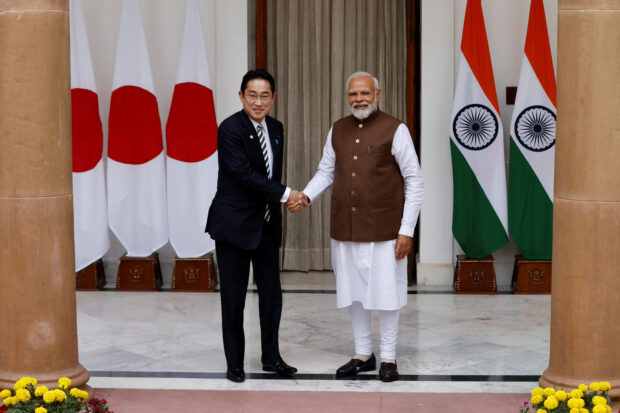Japan plans $75-B investment across Indo-Pacific to counter China

Japan Prime Minister Fumio Kishida shakes hands with his Indian counterpart Narendra Modi before their meeting at the Hyderabad House in New Delhi, India, March 20, 2023. REUTERS/Adnan Abidi
TOKYO/NEW DELHI – Japan‘s Prime Minister Fumio Kishida on Monday announced a new plan to promote an open and free Indo–Pacific, promising billions of dollars in investment to help economies across the region in everything from industry to disaster prevention.
The plan he announced in New Delhi is seen as Tokyo’s bid to forge stronger ties with countries in South and Southeast Asia to counter China‘s growing assertiveness there.
Kishida also said Japan wanted Russia’s invasion of Ukraine to end as soon as possible and called on the “Global South”, a broad term referring to countries in Africa, Asia, Oceania and Latin America, to “show solidarity” after his talks with Indian Prime Minister Narendra Modi.
Kishida said there were four “pillars” to Japan‘s new Indo–Pacific plan: maintaining peace, dealing with new global issues in cooperation with Indo–Pacific countries, achieving global connectivity through various platforms, and ensuring the safety of the open seas and skies.
Japan pledged $75 billion to the region by 2030 via private investment and yen loans and by ramping up aid through official governmental assistance and grants.
“We plan to expand the cooperation of the free and open Indo–Pacific framework,” Kishida told the Indian Council of World Affairs.
He emphasized the increasing connectivity among countries and promoting freedom of navigation, with an eye on increasing maritime defense and security among like-minded countries.
China has ramped up its military presence in the Indo–Pacific and rapidly modernized its navy while promoting its Belt and Road Initiative.
“The kind of connectivity where you only rely on one country breeds political vulnerability,” Kishida said.
“We aim to increase the number of options each country has so that they can overcome these vulnerabilities and achieve further economic growth through connectivity,” he added.
Naval drills
“We will conduct joint maritime exercises with India and the United States, as well as goodwill exercises with Asean and the Pacific Islands,” Kishida said.
Japan, India, Australia and the United States are members of the so-called Quad grouping, created to balance China’s growing dominance. The four are will participate in the annual naval wargaming exercise Malabar to be held in Australia this year.
India and Japan have deepened their ties in defense and strategic affairs in the face of a dominant China.
“India is an essential partner when it comes to realizing our free and open Indo–Pacific vision,” Kishida later told reporters when asked why he chose New Delhi to announce his plan.
Modi said strengthening the India-Japan “partnership is not only important for both our countries, it also promotes peace, prosperity and stability in the Indo–Pacific region”.
The two have different stances on the war in Ukraine, however.
“We want to stop the invasion by Russia as soon as possible. In order for that to happen, it’s important for the international community, including the so-called Global South, to show solidarity,” Kishida said when asked about his discussions with Modi.
Japan has imposed sanctions on Russia, as have many other nations.
India has not, and it has refused to blame Moscow for the conflict and has ramped up its buying of Russian oil.
“Giving voice to the priorities of the Global South is an important pillar of our G20 presidency,” Modi said after his talks with Kishida.
RELATED STORIES
Australia, US, Japan seek to counter China infra push
U.S. and Japan pursue commercial diplomacy to counter China, envoy to Tokyo says
Read Next
Subscribe to INQUIRER PLUS to get access to The Philippine Daily Inquirer & other 70+ titles, share up to 5 gadgets, listen to the news, download as early as 4am & share articles on social media. Call 896 6000.
For feedback, complaints, or inquiries, contact us.
For all the latest Business News Click Here
For the latest news and updates, follow us on Google News.



